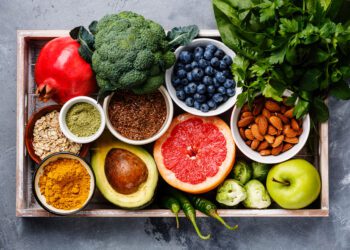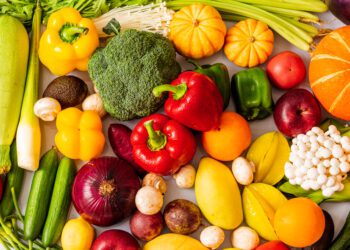Filling your body with the proper nutrients and energy is akin to using “premium” gasoline in an automobile. If you knew for certain that your car would run more efficiently, giving you more miles per gallon, on premium unleaded fuel than on economy fuel, you would surely use the premium fuel over the economy version. Likewise, filling our bodies with the best nutrients and foods will help them to work more efficiently for longer periods of time. Food directly impacts cognitive performance. This is why many people experience an afternoon slump after they didn’t eat healthily at lunchtime.
Foods That Can Boost Productivity
Foods that we eat are converted by our bodies into glucose, creating energy that powers our bodies and brains. When our bodies and brains are running low on glucose, we have trouble staying focused and concentrating (which is often responsible for the afternoon slump mentioned above). Not all foods that we eat are processed by our bodies at the same rate, either. Some foods release glucose quickly, leading to a burst of energy that is followed by a rapid depletion of energy. Other foods provide more sustained energy, but require more work from the digestive system, which can reduce oxygen levels in the brain and leave us feeling groggy.
Carbohydrates
Carbohydrates, which are one of the three macronutrients of the human diet, are our bodies’ main source of energy. They are found in various forms, like sugars and dietary fiber, and in a variety of foods, including whole grains, vegetables and fruits. Like anything, eating either too much or too little carbohydrates can have negative effects on our bodies.
Carbohydrates provide the energy our bodies need to carry out functions. They affect blood sugar and insulin levels as well as metabolism of fat in our bodies. They support digestion, and affect how nutrients are absorbed during digestion.
Simple carbohydrates are absorbed by the body and converted into quick energy. These include simple sugars and fruit juices. Complex carbohydrates are longer-lasting, producing energy at a slower rate. They are very beneficial for our bodies and for productivity, and they help to fuel exercise as well as our brains. Complex carbohydrates can be found in whole grains, pasta, and cereals. Additionally, complex carbohydrates have more nutrients and fiber and can help us to feel satisfied after eating them.
Not getting enough carbohydrates (often referred to as having “low blood sugar”) can make us feel weak, tired, and have problems concentrating. Low glucose levels in the body can even inhibit self-control, causing a lessened ability to stay on task and be productive at work (and, paradoxically, an increased likelihood of choosing unhealthy foods).
Fruit and Veg
Some of the best fruit and vegetable choices for workplace productivity include:
- Bananas – The potassium and carbohydrates found in bananas provide long-lasting energy.
- Kale and Spinach-Leafy greens are rich in iron, carrying oxygen through your body’s cells to create energy and enhancing productivity.
- Berries – Berries contain antioxidants, protecting the brain from damage and improving communication between neurons.
Protein
Made up of amino acids, protein fuels vital reactions throughout the body. Having too little protein in the body can lead to muscle loss and tissue breakdown. Having too much protein, however, can lead to its storage as fat.
Water
How much water should you be drinking a day? You’ve probably heard the standard “8 glasses of water a day” advice. This is average, with some people needing more and some, less. The rule of thumb is to drink when you feel thirsty. The U.S. Academies of Sciences, Engineering and Medicine recommend that men drink 15.5 cups of water per day, and women drink 11.5 cups of water daily.












